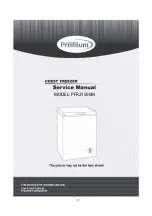
5
Electrical Requirements
Before you move your refrigerator into its final location, it is
important to make sure you have the proper electrical
connection.
Recommended grounding method
A 115 Volt, 60 Hz., AC only 15- or 20-amp fused, grounded
electrical supply is required. It is recommended that a separate
circuit serving only your refrigerator be provided. Use an outlet
that cannot be turned off by a switch. Do not use an
extension cord.
NOTE: Before performing any type of installation, cleaning, or
removing a light bulb, turn the Temperature Control to the off
position as shown and then disconnect the refrigerator from the
electrical source.
When you are finished, reconnect the refrigerator to the electrical
source and reset the Temperature Control to the desired setting.
Refrigerator Door
TOOLS NEEDED:
⁵⁄₁₆
" hex-head socket wrench,
⁵⁄₈
" hex-head
socket wrench,
¹⁄₄
" hex-head socket wrench,
¹⁄₂
" hex-head socket
wrench,
³⁄₈
" hex-head socket wrench, #2 Phillips screwdriver, flat-
blade screwdriver,
⁵⁄₁₆
" open-end wrench, flat 2" putty knife.
IMPORTANT:
■
All graphics referenced in the following instructions are
included later in this section after “Final Steps.” The graphics
shown are for a right-hand swing door (hinges factory
installed on the right).
■
If you only want to remove and replace the door, see the
“Remove Door and Hinges” and “Replace Door and Hinges.”
■
Before you begin, turn the control OFF, and remove food and
adjustable door or utility bins from door.
Remove Door and Hinges
⁵⁄₁₆
" Hex-Head Hinge Screw
1. Unplug refrigerator or disconnect power.
2. Open refrigerator door and remove base grille from the
bottom front of the refrigerator. See Base Grille Graphic 1A.
3. Close the refrigerator door and keep it closed until you are
ready to lift it free from the cabinet.
NOTE: Provide additional support for the door while the
hinges are being moved. Do not depend on the door magnets
to hold the door in place while you are working.
4. Remove the parts for the top hinge as shown in Top Hinge
Graphic 1B.
5. Lift the refrigerator door free from the lower hinge and cabinet
and set aside.
6. Remove 3 hex head hinge screws and bottom hinge
assembly. See Bottom Hinge Graphic 1C.
Reverse Door (optional on some models)
IMPORTANT: If you want to reverse your door so that it opens in
the opposite direction, continue with “Reverse Door (optional)”
instructions. If you are not reversing the door, see “Replace Door
and Hinges.”
Cabinet
1. Remove the cabinet hinge hole plugs from the cabinet top
and move them to the opposite side hinge holes as shown in
Graphic 2.
2. Remove the door stop screws from the Bottom Hinge
bracket. See Bottom Hinge Graphic 1C
3. Remove the Hinge Pin Nut and Hinge Pin from the hinge
bracket.
4. Rotate the hinge bracket for installation on the opposite side
of the cabinet. See Graphic 3
5. Reinstall the Hinge Pin Nut and Hinge Pin to the hinge
bracket. Hinge Pin must point “up” when hinge bracket is
installed to the cabinet.
6. Invert the door stop so that the countersunk holes line up
with the screw holes in the hinge assembly. See Graphic 4
7. Reinstall the door stop screws. See Graphic 3.
8. Reinstall the hinge assembly to the cabinet with the 3 hex
head hinge screws.
Electrical Shock Hazard
Plug into a grounded 3 prong outlet.
Do not remove ground prong.
Do not use an adapter.
Do not use an extension cord.
Failure to follow these instructions can result in death,
fire, or electrical shock.
WARNING






































